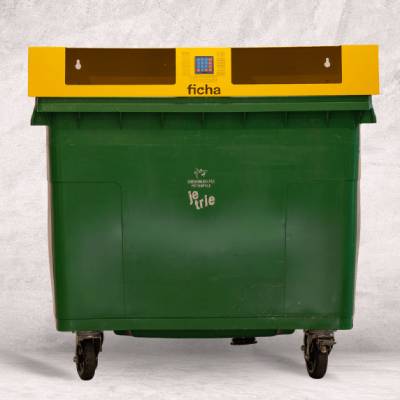How can we encourage the public to sort their waste correctly? It was this environmental question that led Ritu Raj Shrivastwa, a former student in the international master's degree programme at Grenoble INP - Ense3, UGA, Vincent Hipault and Hubert Ménard to start their company in 2017. Their solution was to reward users for their sorting skills by analysing the contents of the bins.
“To accomplish this, we first needed waste identification and classification technology,” says the head of the company, Hubert Ménard.
“After studying the issue, we realised that artificial intelligence offered the best solution. Our product, called Cocon, uses image recognition software to analyse the contents of sorting bins.”
Cocon is a steel frame featuring two 37-cm openings and an integrated camera that fits onto the top of sorting bins. The camera takes pictures of the waste that users deposit in the bins (users are identified via the Ficha app on their smartphones). The image recognition software then analyses them in real time. The system counts the number of waste items sorted correctly, awarding points to the user and highlighting any sorting errors. The points users earn can then be exchanged for individual or collective prizes.
“We have partnered with businesses and municipalities to offer rewards in the form of products or city services, such as free rides on electric scooters, a basket of groceries, admission to the pool or cinema tickets.”
 From social housing landlords to municipalities
From social housing landlords to municipalities
Cocon, which has been marketed since 2021, was initially installed in bin storage rooms owned by social housing landlords, where sorting is particularly inefficient. Based on advice from the municipalities they had approached at the same time, including that of Grenoble, the young entrepreneurs developed a sensor designed to be installed directly on collection trucks to analyse waste as it was being thrown in.
The sensor they then developed and marketed relies on the same identification technology as Cocon. “The only thing that changes is the databases used by the image recognition models to adapt to the new waste environment.” During the experimentation phase, Ficha asked the municipalities to use the collection truck sensors to map the quality of sorting by neighbourhood. The aim is to then install Cocons in areas where sorting is least effective. “We have clearly identified three targets that sort poorly: students and people living in disadvantaged neighbourhoods and city centres.”
Now that the experimentation phase is over, the product is ready to be rolled out. The goal is to sell 100 Cocons in 2023!
“Since we are responding to calls for tenders for dozens of Cocons for municipalities, often as a subcontractor for waste management companies like Veolia or Suez, it could go fast!” An initial round of fundraising is currently underway to raise the €840,000 needed to continue product development, hire more team members (there are currently 11 employees), and improve the relevance of image recognition algorithms.
“If all goes well, we will expand internationally in a year and be profitable by 2025.” To be continued...




 From social housing landlords to municipalities
From social housing landlords to municipalities